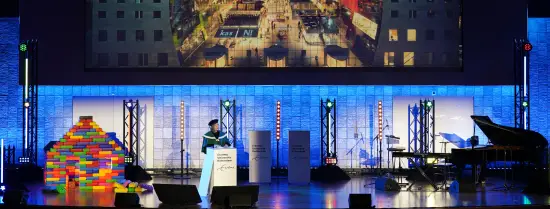Gabi Helfert, originally from Germany, started working at RSM in 2008. She has held various positions and has been the executive director of 15 master's programs for the past 7 years. She loves cooking, especially on weekends. 'Recipes are often too rigid for me; I use them as inspiration and then add my own twist. But sometimes, you need to be very precise. For example, if you want to make cheese from cashews, don't improvise! It's the same in work: sometimes the rules are the most important, and you can't deviate from them. But in other cases, you can make more progress if you apply them flexibly. Knowing the difference between the two is a great art and a continuous challenge.”
I have been vegan since 2011, so the hard-boiled egg for lunch that I had when I started at EUR is no longer on the menu. The main motivator was animal welfare; when I read Jonathan Safran Foer's book 'Eating Animals,' I couldn't support the use of animals anymore. But it's also much better for the environment. Green is my favorite color when it comes to food. Have you ever looked closely at Brussels sprouts or broccoli when you briefly cook them? The color becomes so vibrant! I also eat spinach and peas almost daily, in salads or with noodles or rice.
EUR has changed in many ways over the past 15 years. Of course, international students and staff (at RSM, 40% and 60%, respectively) have brought a tremendously colorful and diverse atmosphere to the campus. There have also been significant changes in sustainability: you can only print if you're physically at the printer to retrieve your prints, and waste separation is practiced across the entire campus, making everyone more conscious of what we throw away and where. The Foodlab and the Sustainability Hub are also wonderful examples, and sustainability is increasingly being integrated into educational programs.
Another change is the focus on the well-being of students and staff; it's no longer just about performance, and that's a good thing. We are all human and need human attention, reflection, and moments of rest.
Diversity, inclusion, and accessibility are also slowly making their way onto the agenda. It will still take some time before all the necessary accommodations for people with different bodies, neurodiverse brains, or other socio-cultural backgrounds are truly in place, but at least there is attention being paid to it.
Working at EUR can also be a bit crunchy at times; not everything goes smoothly. Sometimes, you really have to chew on matters and show perseverance. And as someone from a diverse background, I find EUR to be traditional in some respects, if not downright old-fashioned: the cheese sandwich in the cafeteria, the fraternity culture with alcohol during initiation activities – not really in line with student cultures worldwide. But EUR can also be surprising: suddenly, there was a rainbow crosswalk!"

